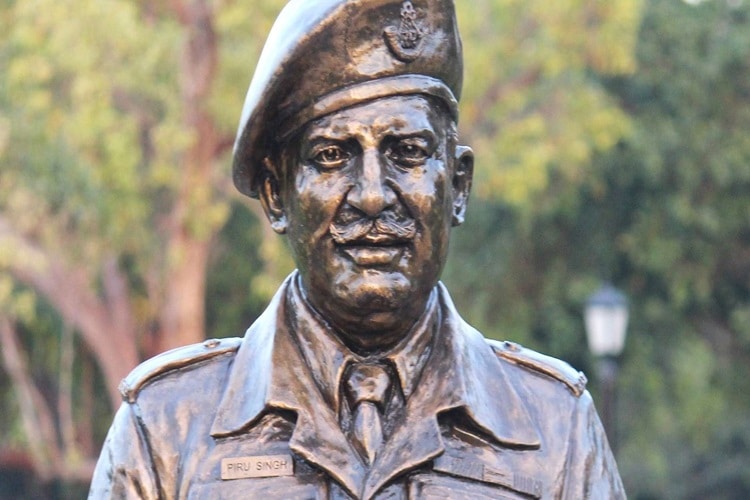Piru Singh: A Tale of Bravery and Sacrifice

Piru Singh (20 May 1918 – 18 July 1948) was an Indian Army non-commissioned officer.
Life and Career
Piru Singh was born on May 20, 1918, in Rajasthan, India. Piru Singh joined the British Indian Army and later continued his service in the Indian Army after independence in 1947. He was a part of the 6 Rajputana Rifles during the First Kashmir War in 1947-48. The 6 Rajputana Rifles played a crucial role in the conflict, defending the borders of the newly formed independent India.
Piru Singh was awarded the Param Vir Chakra, India’s highest military decoration for valor, posthumously for his actions during the Battle of Tithwal (Jammu and Kashmir) on July 18, 1948.
His citation reads: “During the attack on Tithwal, Havildar Piru Singh was in command of a forward section that bore the brunt of an enemy counterattack launched with the aim of regaining lost ground. The section held its ground with determined courage and inflicted heavy casualties on the enemy. During the action, Havildar Piru Singh was wounded, but he continued to encourage his men and led a countercharge which completely upset the enemy’s plans and forced them to withdraw, leaving behind many dead and wounded.”
Despite being severely injured, Havildar Piru Singh refused to be evacuated and chose to stay with his men. Unfortunately, he succumbed to his injuries, but his exceptional bravery and leadership ensured the success of the mission. He passed away on July 18, 1948, at Tithwal, Jammu and Kashmir.
Award and Legacy
Havildar Piru Singh was posthumously awarded the Param Vir Chakra (PVC), India’s highest military decoration for valor. The PVC was conferred upon him for his extraordinary courage, leadership, and sacrifice during the Battle of Tithwal in 1948. Havildar Piru Singh’s life and sacrifice serve as a perpetual source of inspiration for the youth and future generations of India. His dedication to duty, courage under fire, and selfless leadership set a high standard for those aspiring to serve in the armed forces.
Piru Singh’s legacy is deeply embedded in the ethos of the Indian Army. His unwavering commitment to his fellow soldiers and the nation reflects the core values of the armed forces, fostering a sense of pride and honor among the military community. Havildar Piru Singh, along with other PVC awardees, is remembered annually on Param Vir Chakra Day, celebrated on January 26th. This day honors the recipients of India’s highest military decoration and pays tribute to their indomitable spirit and sacrifice for the country.
Various memorials and commemorations across the country serve as a reminder of Havildar Piru Singh’s bravery. These include local memorials, regimental honors, and ceremonies that ensure his name is eternally associated with the history of the Indian Army. Havildar Piru Singh’s actions at the Battle of Tithwal are studied in military history, providing valuable lessons in leadership and battlefield tactics. His story is often shared with military personnel during training to instill a sense of duty and dedication to the nation.
Piru Singh’s legacy extends beyond the military, impacting the wider community and nation. His story serves as a reminder of the sacrifices made by the armed forces to protect the sovereignty of the country, fostering a sense of national pride and gratitude.
Observer Voice is the one stop site for National, International news, Sports, Editor’s Choice, Art/culture contents, Quotes and much more. We also cover historical contents. Historical contents includes World History, Indian History, and what happened today. The website also covers Entertainment across the India and World.
Follow Us on Twitter, Instagram, Facebook, & LinkedIn

